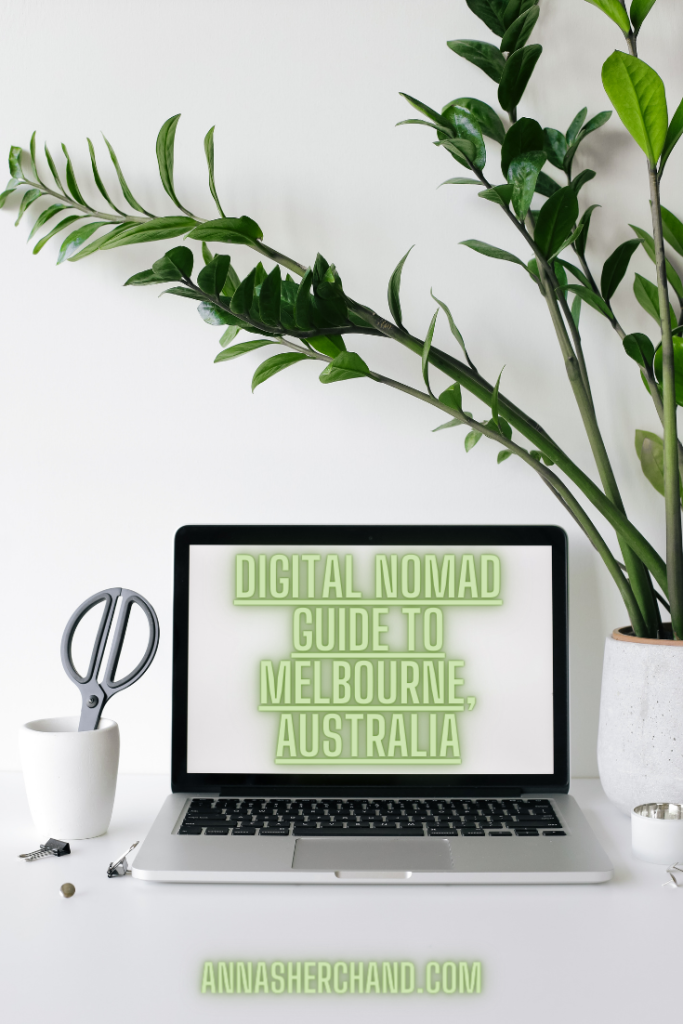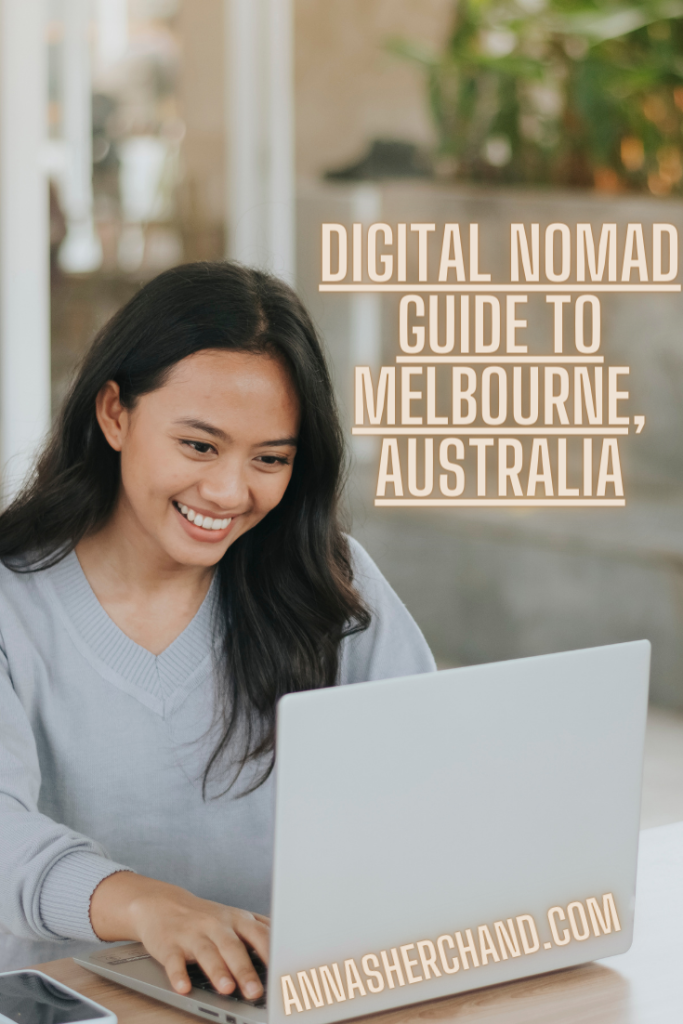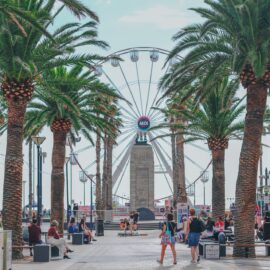Melbourne, Australia has been consistently ranked as one of the most livable cities in the world, and for good reason. With its high quality of life, vibrant culture, and excellent infrastructure, Melbourne has become a sought-after destination for digital nomads and ex-pats. The city is known for its diverse range of restaurants, cafes, and bars, as well as its lively arts and music scene. Melbourne also boasts a clean and safe environment, with well-maintained parks and gardens, making it an attractive option for those seeking a relaxed and laid-back lifestyle. In this article, we’ll explore the pros and cons of digital nomading in Melbourne, Australia, and help you decide whether this city is the right destination for your next adventure as a digital nomad.


Pros of digital nomading in Melbourne, Australia
1. Vibrant and Cosmopolitan City
Melbourne is known for its bustling and lively city life. With a diverse mix of cultures, a thriving arts scene, cuisines, and entertainment options, you’ll never run out of things to do. The city has a rich history and is home to a range of historic buildings and landmarks, as well as modern architecture and cutting-edge design. Melbourne is also known for its street art and graffiti culture, with colorful murals and installations found throughout the city.
The city hosts several major events and festivals throughout the year, including the Melbourne International Comedy Festival, the Australian Open tennis tournament, F1, and the Melbourne Cup horse race, which attract visitors from around the world. Melbourne’s food and dining scene is also a major drawcard, with a diverse range of cuisines and dining experiences on offer, from street food and food trucks to high-end restaurants and fine dining. The city is home to several iconic dishes and food experiences, including the Melbourne-style coffee culture, the classic Australian meat pie, and the famous Queen Victoria Market, which is one of the largest open-air markets in the Southern Hemisphere. Overall, Melbourne’s vibrant and cosmopolitan atmosphere, with its arts and culture scene, diverse dining options, and live events and festivals, make it an attractive destination for digital nomads who are looking for a city that offers a great work-life balance and plenty of opportunities for relaxation and entertainment.
Melbourne travel guide for first timers
Fun things to do at night in Melbourne
More Melbourne travel tips
2. Access to High-speed Internet
Access to high-speed internet is crucial for digital nomads, as it enables them to stay connected with clients and colleagues around the world. Fortunately, Melbourne has a well-developed and reliable internet infrastructure, making it a great destination for remote workers. Many cafes and restaurants in Melbourne offer free Wi-Fi for customers, which can be a convenient option for digital nomads who prefer to work from public spaces. However, it’s important to note that the quality of free Wi-Fi can vary widely, and may not always be reliable or secure.
For more reliable and high-speed internet access, co-working spaces and serviced offices in Melbourne typically offer dedicated internet connections with speeds of up to 1Gbps. Some co-working spaces even offer backup internet connections and redundant power supplies to ensure uninterrupted internet access. In addition, major telecom providers such as Telstra, Optus, and Vodafone offer a range of mobile broadband plans with high data allowances, which can be a useful option for digital nomads who need to stay connected on the go.
Overall, Melbourne’s reliable and high-speed internet infrastructure makes it a great destination for digital nomads who need to stay connected and productive while working remotely. Whether you prefer to work from cafes or co-working spaces, there are plenty of options available to ensure you have access to fast and reliable internet.
3. Great Infrastructure
Melbourne’s great infrastructure is another key factor that makes it an attractive destination for digital nomads. The city has a well-developed transportation network, including an extensive tram system, trains, buses, and bike lanes, making it easy to get around the city quickly and efficiently. Melbourne is also home to several major airports, including Melbourne Airport and Avalon Airport, which offer domestic and international flights to a wide range of destinations. This makes it easy for digital nomads to travel within Australia and beyond, whether for work or leisure.
4. Ease of Accommodation
Melbourne offers a range of accommodation options to suit all budgets and preferences, including hostels, luxury hotels, serviced apartments, hostels, and Airbnb rentals. The city has a well-developed tourism industry and caters to a wide range of travelers, making it easy for digital nomads to find suitable accommodation during their stay. Additionally, many hotels and serviced apartments offer business facilities and high-speed internet, making them ideal for digital nomads who need to work from their accommodations.
5. Co-working Spaces
Melbourne has a vibrant start-up and entrepreneurial culture. As a result, you’ll find plenty of co-working spaces where you can work alongside other like-minded individuals. Here are some of the most popular co-working spaces in Melbourne,
Hub Australia – Hub Australia is one of the largest co-working spaces in the country, with multiple locations across Melbourne. The spaces are designed to foster collaboration and community and offer a range of amenities including meeting rooms, event spaces, and private offices.
WeWork – WeWork is a global co-working giant with several locations in Melbourne. The spaces are designed to promote creativity and productivity and offer a range of services including printing, coffee, and networking events.
Gravity Coworking – Gravity Coworking is a boutique co-working space located in the heart of Melbourne’s CBD. The space is designed to cater to freelancers, startups, and small businesses, and offers flexible memberships and 24/7 access.
The Commons – The Commons is a trendy co-working space with multiple locations across Melbourne. The spaces are designed to foster creativity and collaboration and offer a range of amenities including event spaces, bike storage, and rooftop gardens.
Inspire9 – Inspire9 is a community-focused co-working space located in Richmond. The space is designed to inspire innovation and creativity and offers a range of services including mentorship, workshops, and networking events.
These co-working spaces are just a few of the many options available in Melbourne. Each space has its own unique vibe and amenities, so it’s worth doing your research to find the right fit for your needs as a digital nomad.
CreativeCubes.Co – CreativeCubes.Co is a premium co-working space that caters to startups, entrepreneurs, and established businesses. The space offers a range of amenities including meeting rooms, event spaces, and private offices.
Dimension5 – Dimension5 is a co-working space located in the heart of Melbourne’s tech hub. The space is designed to cater to tech startups and entrepreneurs and offers a range of amenities including high-speed internet, event spaces, and meeting rooms.
Beautiful Scenery: Melbourne is known for its beautiful scenery, including stunning beaches, parks, and gardens. You can take a break from work and explore the city’s natural beauty.
6. Cultural Events and Festivals
Melbourne is known for its cultural events and festivals, including the Melbourne International Arts Festival, Melbourne International Comedy Festival, and Melbourne Food and Wine Festival. As a digital nomad, you’ll have the opportunity to experience these events firsthand.
In addition to these major events, Melbourne also has a range of smaller, community-focused cultural festivals that celebrate the city’s diverse multicultural heritage. These events include the Chinese New Year Festival, the Greek Festival, and the Melbourne Festival, which features a range of performances, exhibitions, and installations across the city.
Good Healthcare SystemMelbourne’s healthcare system is also highly regarded, with a range of public and private hospitals, clinics, and medical facilities available throughout the city. This can provide peace of mind for digital nomads who may need access to healthcare services during their stay
7. Access to Nature and Outdoor Activities
Melbourne is surrounded by natural beauty, including beaches, forests, and parks. As a digital nomad, you can take advantage of the city’s location and explore the great outdoors.
Melbourne day trips in winter
Day Hikes in Melbourne
8. Friendly People
Melbourne is known for its friendly and welcoming locals, which can make it a great destination for digital nomads who are looking for a sense of community and connection while living and working abroad. We are also often described as open-minded, laid-back, and easy-going, and are known for our love of good food, coffee, and conversation.
Melbourne’s multiculturalism also adds to the friendly and welcoming atmosphere of the city. With a large population of immigrants and ex-pats, the city is known for its diverse and inclusive community, where people from all backgrounds are welcome and celebrated.In addition, Melbourne has a range of community groups and events that are designed to bring people together and promote social connections, including Meetup groups, coworking spaces, and social clubs. These can provide digital nomads with opportunities to connect with like-minded individuals and make new friends while living and working in Melbourne.
https://www.facebook.com/groups/9032633203445059
9. Multicultural Cuisine
Melbourne, Australia is known for its diverse food culture and has many options for digital nomads looking to explore multicultural cuisine. Here are some recommendations:
Chinatown: Melbourne’s Chinatown is a hub of Asian food, with a wide range of Chinese, Japanese, Korean, and Vietnamese restaurants. It’s a great place to explore the flavors of Asia and try out some delicious and authentic dishes.
Queen Victoria Market: This historic market is one of Melbourne’s most popular food destinations, offering a range of multicultural food options. You can find everything from fresh seafood to exotic spices and specialty foods from around the world.
Little Italy: Melbourne’s Little Italy neighborhood, also known as Lygon Street, is a must-visit for lovers of Italian cuisine. With a wide range of Italian restaurants, cafes, and gelato shops, you can indulge in some of the best pizza, pasta, and desserts in town.
African cuisine: Melbourne has a growing African food scene, with many restaurants offering dishes from countries such as Ethiopia, Eritrea, and Sudan. Check out restaurants like Nyala African Restaurant or Addis Ethiopian Restaurant for an authentic African dining experience.
Middle Eastern cuisine: Melbourne also has a vibrant Middle Eastern food scene, with restaurants offering delicious dishes from countries like Lebanon, Turkey, and Iran. Head to places like Tiba’s Lebanese Restaurant or Shukah for some mouth-watering Middle Eastern fare.
Overall, Melbourne has a lot to offer for digital nomads looking to explore multicultural cuisine. Whether you’re in the mood for Asian, Italian, African, Middle Eastern, or any other type of food, there’s something for everyone in this vibrant and diverse city.
10. Flexibility and Freedom
As a digital nomad, you have the flexibility and freedom to work from anywhere in the world. This means you can explore Melbourne during the day and work remotely in the evenings. Or depending on your timezone, there are tons of other things to do at night too if you have to work during the day.
11. Collaborative Community
A collaborative community is a concept that refers to a group of people who share common interests and goals and work together toward achieving those goals. In the context of digital nomads in Melbourne, this means being part of a community of entrepreneurs, start-up founders, and other remote workers who are working towards building their businesses or careers while enjoying the flexibility of remote work.
Melbourne’s start-up and entrepreneurial community is known for its collaborative and supportive culture. There are many co-working spaces, networking events, and meetups where digital nomads can connect with other professionals in their field. These events provide opportunities to share ideas, collaborate on projects, and network with potential clients or investors.
In addition to these formal events, Melbourne has a vibrant social scene that includes bars, cafes, and restaurants where digital nomads can socialize and connect with other professionals. Many of these venues host events, such as live music or trivia nights, which provide opportunities to meet new people and expand your professional network.
Overall, being part of Melbourne’s collaborative community can provide digital nomads with a sense of belonging and support, as well as opportunities for growth and development. Whether you’re looking to start your own business or advance your career, being part of a collaborative community can help you achieve your goals and make valuable connections along the way.
12. Work-Life Balance
Melbourne has a relaxed and laid-back lifestyle, which can make it easier to achieve a good work-life balance. You can enjoy your work while also taking time to explore the city and enjoy leisure activities
13. Best Coffee Shops
One of the pros of digital nomading in Melbourne is the abundance of great coffee shops. Melbourne is known for its coffee culture, and there are many excellent cafes throughout the city where you can enjoy a delicious cup of coffee while you work remotely.
Some of the best coffee shops in Melbourne for digital nomads include:
- Dukes Coffee Roasters – This cafe is known for its specialty coffee and is a popular spot for digital nomads. The cafe has a relaxed atmosphere and is a great place to get work done.
- Industry Beans – This coffee shop has a unique industrial-chic vibe and is a great place to work and meet other digital nomads. They serve delicious coffee and have a variety of food options as well.
- St. Ali – St. Ali is another popular coffee shop in Melbourne for digital nomads. They offer a variety of coffee brewing methods and have a cozy atmosphere that’s perfect for getting work done.
- Patricia Coffee Brewers – This cafe is known for its minimalist decor and excellent coffee. It’s a great place to grab a quick cup of coffee or spend a few hours working on your laptop.
- Auction Rooms – Auction Rooms is a spacious coffee shop that’s perfect for digital nomads who need plenty of space to work. They serve a variety of coffee and food options, and the atmosphere is relaxed and welcoming.

Cons of digital nomading in Melbourne, Australia:
1. High Cost of Living
Melbourne is one of the most expensive cities in Australia, and the cost of living can be high. Accommodation, food, and entertainment can be expensive, which can be a challenge for digital nomads on a budget.
Accommodation: Rent prices for a one-bedroom apartment in Melbourne’s city center can range from AUD 2,000 to AUD 5,000 per month. Co-living spaces and shared accommodation can be more affordable options, starting from around AUD 800 per month.
Food and Drinks: A meal at a mid-range restaurant in Melbourne can cost around AUD 25 to AUD 40, while a cup of coffee can cost around AUD 4 to AUD 5. Groceries can be expensive as well, with a gallon of milk costing around AUD 5.50 and a loaf of bread costing around AUD 3.50 to AUD 5.
Transportation: The cost of public transportation in Melbourne can vary depending on the mode of transport and the distance traveled. A single trip on a tram or bus can cost around AUD 4, while a monthly pass can cost around AUD 150. Taxis and ride-sharing services can be expensive, with a taxi ride from the airport to the city center costing around AUD 60.
Entertainment: The cost of entertainment in Melbourne can vary widely, but tickets to concerts, festivals, and sports games can be expensive. For example, tickets to a major music festival can cost around AUD 300, while tickets to an AFL football game can cost around AUD 30 to AUD 50.
These numbers are estimates and may vary depending on the specific circumstances of each digital nomad. Nonetheless, they give an idea of the high cost of living in Melbourne and the potential impact on a digital nomad’s budget.
2. Unpredictable Weather
Melbourne is well-known for its unpredictable weather, which can be a challenge for digital nomads who may need to plan their activities and work schedule around the weather conditions. Here are some factors to consider:
Four Seasons in One Day: Melbourne’s weather is notoriously unpredictable, with the city experiencing “four seasons in one day” on a regular basis. This means that the weather can change quickly, with rain, wind, sunshine, and cold temperatures all possible on the same day.
Temperature Fluctuations: Melbourne’s weather can also be characterized by significant temperature fluctuations, even within the same day. For example, it’s not uncommon for the temperature to start off chilly in the morning and then rise to a hot and humid day later on and be rainy later at night. This can make it difficult to dress appropriately for the weather and to stay comfortable throughout the day.
Extreme Weather Events: While Melbourne doesn’t experience extreme weather events like hurricanes or tornadoes, it can still be impacted by severe weather conditions such as heavy rainfall, strong winds, and heat waves. These events can disrupt travel plans and outdoor activities, and may also impact the city’s infrastructure and public transport services.
Seasonal Variations: Melbourne experiences four distinct seasons, with summer (December to February) being the hottest and driest, and winter (June to August) being the coolest and wettest. Spring and autumn can be mild and pleasant, but still subject to unpredictable weather conditions.
3. Time Difference
If you’re working with clients in other parts of the world, the time difference between Melbourne and other countries can be a challenge. You may need to work odd hours to stay in touch with clients.
Melbourne is located in the Australian Eastern Standard Time (AEST) zone, which is GMT+10. During daylight saving time (DST), which typically runs from the first Sunday in October to the first Sunday in April, Melbourne switches to Australian Eastern Daylight Time (AEDT), which is GMT+11.It’s important for digital nomads to be aware of the time difference between Melbourne and their home country or clients they work with, as it can impact their work schedule and communication. For example, if you’re based in Melbourne and working with clients or colleagues in the United States, you’ll likely be working during their nighttime hours due to the time difference. On the other hand, if you’re working with clients in Asia, the time difference may work in your favor, as Melbourne is a few hours ahead of many Asian cities.
4. Crowded Public Transport
Melbourne’s public transport system, which includes trains, trams, and buses, can be crowded during peak hours, particularly on weekdays. This can be a challenge for digital nomads who rely on public transport to get around the city, as it can impact their travel time, comfort, and overall experience. Here are some factors to consider,
Peak Hour Crowds: Melbourne’s public transport system can be particularly crowded during peak hours, which typically run from 7 am to 9 am and from 5 pm to 7 pm on weekdays. This can make it difficult to find a seat, and may also lead to delays and longer travel times.
Limited Seating: Many of Melbourne’s trams and buses are designed for standing passengers, with limited seating available. This can be uncomfortable for longer journeys or for those with mobility issues.
Rush Hour Delays: Melbourne’s public transport system can also be subject to delays and disruptions during peak hours, due to factors such as overcrowding, track maintenance, or accidents. This can impact your ability to arrive at meetings or appointments on time, and may also impact your work productivity.
That said, the use of alternative transport options could be helpful. While Melbourne’s public transport system can be crowded, there are also alternative transport options available, such as cycling, walking, and ride-sharing services. Depending on your location and destination, these options may be more convenient and comfortable than using public transport during peak hours.
5. Visa Restrictions
Visa restrictions can be a significant challenge for digital nomads who want to work and stay in Melbourne, Australia. Here are some potential cons related to digital nomad visa restrictions,
Limited Duration: Many digital nomads may be eligible for short-term visas, such as the eVisitor visa or the Electronic Travel Authority (ETA) visa, which allow stays of up to three months. However, these visas may not be sufficient for those who wish to stay longer in Melbourne to pursue work opportunities or establish a more permanent base.
Work Restrictions: Some visas may prohibit or restrict digital nomads from working in Melbourne, which can limit their ability to earn income and support themselves while they are in the city.
Complex Application Process: Applying for a visa to stay and work in Melbourne can be a complex and time-consuming process, requiring detailed documentation, financial statements, and other requirements. This can be a barrier for digital nomads who are used to more flexible and streamlined processes for working and traveling.
Expensive Fees: Depending on the type of visa, application fees can be expensive, which can be a financial burden for digital nomads on a budget.
Overall, visa restrictions can be a significant challenge for digital nomads who want to work and stay in Melbourne. However, it’s important to research visa requirements and options thoroughly and to consult with immigration experts or legal professionals to determine the best approach for your specific situation.
6. Traffic Congestion
Traffic congestion can be a challenge for digital nomads in Melbourne, particularly during peak hours. Here are some potential cons related to traffic congestion,
Longer Commute Times: Melbourne’s roads and highways can become heavily congested during peak hours, which can lead to longer commute times and delays. This can be a challenge for digital nomads who need to travel to meetings or appointments in different parts of the city, or who need to commute to and from co-working spaces.
Increased Stress: Sitting in traffic for long periods of time can be stressful and draining, which can impact your mood and overall well-being. This can make it more difficult to focus on work tasks or to maintain a healthy work-life balance.
Environmental Impact: Traffic congestion can also have negative environmental impacts, such as increased air pollution and greenhouse gas emissions. This can be a concern for digital nomads who value sustainable living and environmental stewardship.
Limited Mobility: For digital nomads who rely on personal vehicles or ride-sharing services, traffic congestion can limit their mobility and flexibility. It can also be a barrier for those who prefer to walk or cycle for health or environmental reasons.
7. Limited Access to Nature in the City
Another potential con of digital nomading in Melbourne is the limited access to nature within the city. While Melbourne has many beautiful parks and green spaces, some digital nomads may find it challenging to access nature without leaving the city limits. Here are some potential drawbacks to limited access to nature:
Limited Opportunities for Outdoor Recreation: For digital nomads who enjoy outdoor activities such as hiking, camping, or fishing, the lack of natural areas within the city can be a drawback. While there are some parks and outdoor spaces within the city, they may not provide the same level of natural beauty and outdoor recreation opportunities as areas outside the city.
Impact on Mental Health: Spending time in nature has been linked to numerous mental health benefits, such as reduced stress and improved mood. For digital nomads who value spending time in nature as part of their self-care routine, limited access to natural areas within the city may be a challenge.
Environmental Concerns: Limited access to nature within the city can also be a concern for digital nomads who are passionate about environmental sustainability and conservation. With fewer natural areas within the city, there may be fewer opportunities for residents to engage in environmental activities such as bird watching or nature conservation.
8. Limited Job Opportunities
Limited job opportunities can also be a potential con for digital nomads in Melbourne. While the city has a thriving start-up and entrepreneurial community, remote jobs or job opportunities for remote workers in traditional industries may be limited. This can make it challenging for digital nomads who rely on stable, long-term employment to sustain their lifestyles.
Additionally, competition for remote work may be high, particularly in industries such as IT, marketing, and design, which tend to attract a large number of remote workers. As such, digital nomads may need to be prepared to compete with other qualified candidates for available job opportunities.
Furthermore, the lack of in-person networking opportunities in traditional industries can also make it challenging for digital nomads to establish professional connections and advance their careers. This can limit their ability to access new job opportunities or to advance within their field.
Overall, while Melbourne offers many opportunities for digital nomads to work in the start-up and entrepreneurial space, limited job opportunities in traditional industries can be a potential challenge for those who require stable, long-term employment to sustain their lifestyle.
9. Limited Public Wi-Fi
While Melbourne does have a decent amount of cafes and public spaces that offer free Wi-Fi, it may not be as widely available as in some other cities. This can be a challenge for digital nomads who rely on internet connectivity to complete work tasks or communicate with clients. Additionally, public Wi-Fi networks can be less secure and may pose a risk to sensitive data or personal information. As such, digital nomads in Melbourne may need to invest in a reliable mobile hotspot or consider working from co-working spaces that offer more secure and reliable Wi-Fi options.
10. Loneliness and Isolation
While the city offers plenty of opportunities to connect with like-minded individuals through co-working spaces, events, and networking groups, it can still be challenging to build a sense of community and belonging as a remote worker. Some potential challenges include:
Lack of Social Interaction: Remote work can be isolating, particularly if you are working from home or in a private workspace. This lack of social interaction can lead to feelings of loneliness and disconnection from others.
Difficulty in Building Long-term Relationships: Digital nomads may struggle to build long-term relationships with others due to their transient lifestyle. This can make it difficult to establish a sense of community or to form close friendships with others.
Time Zone Differences: Time zone differences can also be a potential challenge for digital nomads in Melbourne, particularly if they are working with clients or collaborators in other parts of the world. This can result in a lack of communication and a feeling of disconnection from others.
Join my Melbourne digital nomad community on Facebook to meet like-minded people with a digital nomad lifestyle.
In case digital nomad visas are not for you, perhaps consider working holiday visas and check out how you can backpack in Melbourne.
Let me know in the comments:
If you have any questions about the digital nomad guide to Melbourne
Pros and Cons of living in Australia
Coworking space benefits
Co-working spaces Sydney
Melbourne at night
Melbourne to Grampians road trip
Digital nomad guide to Bagan, Myanmar
Digital nomads Vientiane Laos
Best Coworking space in Barbados
Travel tips to South America
Fiji solo travel guide
Australia east coast must-see
Master Sydney travel guide
Solo travel guide to Brisbane
Exploring Adelaide the best way is a must-read
Important travel tips for Uluru trip
Melbourne travel guide for first timers is here.
Melbourne day trips in winter
Day Hikes in Melbourne
Weekend getaway? Check out things to do in Ballarat
Perth solo itinerary
Top 5 must do in Darwin, Australia
How to go from Dublin to Howth
Solo female travel Romania
Read a recent day trip to Zaanse Schans from Amsterdam
How about a solo itinerary to Canberra– Australia’s capital city?
Solo trip to Peru, travel tips to South America
Going to Vietnam after Australia? Check out the 7 days Hanoi travel guide.
7 days backpacking in Ecuador itinerary
5 days in Oaxaca itinerary
2 days in Mexico City itinerary
Best places to visit from Split
2 days in Split, Croatia
Solo traveling to Mostar
Solo female travel to Kotor
Solo female travel to Budva
Solo female travel Albania
Warsaw by Train covers warsaw travel tips
Check out One day in Luxembourg, western Europe
Day trip from Zurich to Liechtenstein
Book accommodation through trusted Booking.com
I have detailed travel resources right here. Save money, learn what and how.
If you like this article, follow my adventures on Instagram, Facebook, YouTube, Twitter, and Pinterest, but most importantly sign up to my e-mail list to keep up with updates and travel posts!



